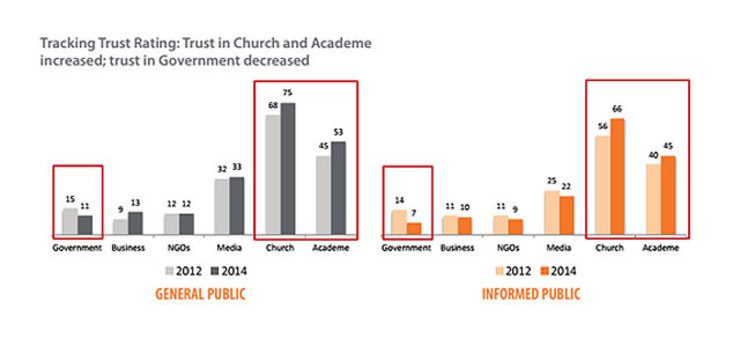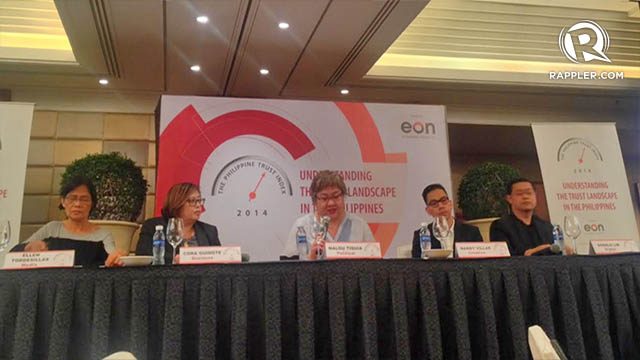SUMMARY
This is AI generated summarization, which may have errors. For context, always refer to the full article.

MANILA, Philippines (UPDATED) – The Catholic Church remains the most trusted institution in the country, according to the 2014 Philippine Trust Index survey, while the Office of the President and the Senate suffered the worst decline in ratings.
These were among the results of the 2014 Philippine Trust Index, which was presented on Monday, October 27, in Makati City. They represented the opinion of 1,626 Filipino respondents from various socioeconomic and educational backgrounds in urban and rural areas all over the country.
The survey respondents identified as “informed public” are those adult Filipinos 25 to 65 years old; have completed at least 3 years of tertiary education; and have access at least twice a week to print, online, and broadcast media. The survey data was gathered from May to June 2014.
The Philippine Trust Index is a research instrument that the country’s top 100 corporations subscribe to. The survey is done annually. The results were presented on by EON Incorporated, the local affiliate of Edelman, the international public relations firm which devised the research tool. Edelman has the “Trust Barometer,” an annual trust and credibility survey which EON’s Philippine Trust Index draws inspiration from.

The results showed that the Church enjoyed a significant and steady increase in ratings, with 75% of the general public and 66% of the informed public saying they trust it “very much.”
The Church saw a significant increase of 21% among informed publics in the urban areas. The results also highlighted that the trust ratings of the Church have been steadily increasing since 2012, the year the first Philippine Trust Index results were released.
The academe, like the Church, also saw a continuous increase in trust levels, with 53% trust rating from the general public from 45% in 2012.
Media is the third most trusted institution with 33% from 32% general public trust in 2012.
Business saw a 4-percentage point increase in trust rating to 13% from 2012’s 9% vote of trust from the general public.
Non-governmental organizations (NGOs) general public trust rating did not change from 12% in 2012.

The least trusted among the institutions is the government.
Biggest losers
The “biggest losers” among the government sub-institutions are the Office of the President and the Philippine Senate.
The Senate had a 7% trust rating from the general public compared to 15% in 2012. The informed public trust is at 4%, down from 2012’s 13%.

The Office of the President saw a decline in general public trust at 16%, from 2012’s 28%. It had a lower trust rating from the informed public at 15%, from 2012’s 24%.
In terms of trust by area, Mindanao has a higher trust rating in government compared to other areas, with a 27% trust rating from the general public and 13% from the informed public.
For 4 of 10 Filipinos, the primary driver of trust in government is freedom from corruption, the survey also showed. Less than 2 of 10 believe that the government is not corrupt.
“The government’s perceived inability to deliver what the people expected of them shows in the Government’s low trust rating,” the survey added.
Filipinos and the Aquinos
Cora Guidote, SM Investments Corporation senior vice president said that business should have the lowest trust rating because it’s primarily driven by profit.
Malou Tiquia, a political management expert, expressed no surprise that the Senate is the least trusted among the government sub-institutions, citing the controversy on the Disbursement Acceleration Program (DAP), Priority Development Assistance Fund (PDAF), and the probe into the corruption scandal faced by Vice President Jejomar Binay.
While the Office of the President’s trust ratings declined, Tiquia said that President Benigno Aquino III still enjoys the Filipinos’ benefit of the doubt, “because he is the son of (Benigno) Ninoy and (Corazon) Cory Aquino.”
“We’re so enamored of the Aquinos. There’s still this romanticism we have with Cory, that’s why [President] Aquino’s trust rating, while eroding, [is still a slow decline]. We’re still giving him the benefit of the doubt,” Tiquia said.
NGOs trust rating ‘suffered because of Napoles’
NGOs suffered a trust rating decline, attributed to Janet Napoles’ dummy NGOs receiving PDAF, the panelists on Monday’s Philippine Trust Index press conference agreed.
“The Napoles incident made NGOs synonymous to ‘corruption,’” Nandy Villar, Customer Relationship Management Head of ABS-CBN said.

Among the general public, 34.1% of them said that the “most important driver to trust NGOs” is incorruptibility, which is echoed by 32% of the informed public.
NGOs into education, health and nutrition, and environment ranked the highest on the trust scale. There was a significant difference in ratings though of NGOs into labor, housing, migrant workers, and women, which enjoyed highest trust levels in urban than rural areas.
Communication is ‘very important’
The Philippine Trust Index also highlighted that trust on the media, specifically television, which enjoyed the highest trust approval among the general public, particularly in the rural areas.
TV remains the common source of information for over 99% of both the general and informed publics. Radio has a 60% general public trust rating and 63% informed public trust approval. The Internet is the third usual source of information for the informed public, the survey showed.
The survey also showed that 9 of 10 Filipinos regard communication as a crucial trust driver, saying that it is “very important” for government, businesses, NGOs, and the media to communicate to its stakeholders.
Six of 10 Filipinos also stated they need to hear about the government, business, NGOs, and media at least two to 3 times for them to believe these institutions.
But 48.4% of survey respondents only needed to hear once from the Church for them to believe the institution.
“Communication is a function of trust. Church is a good communicator but Filipinos readily accept what the Church says because of ‘faith,’ not so much on communication,” Villar said. – Rappler.com
Add a comment
How does this make you feel?
There are no comments yet. Add your comment to start the conversation.